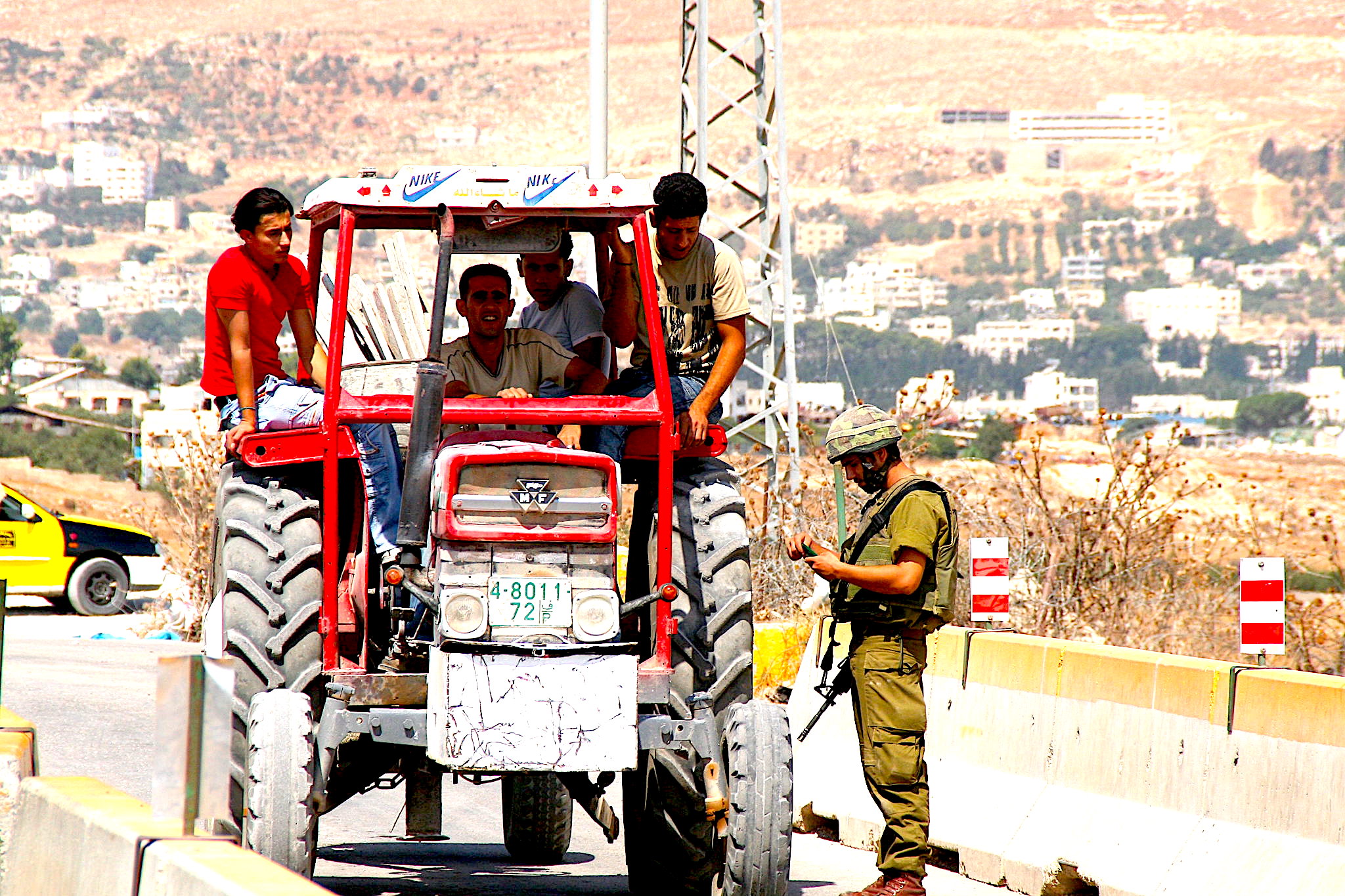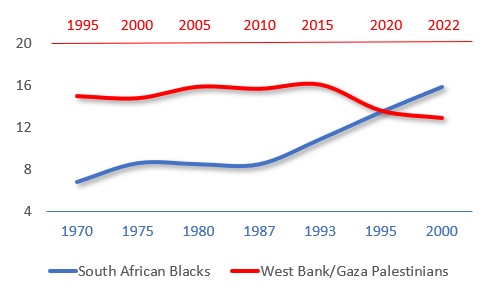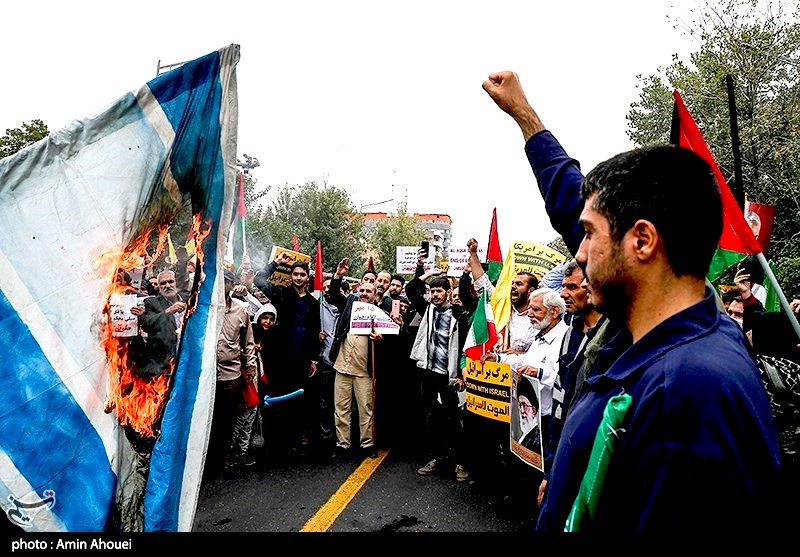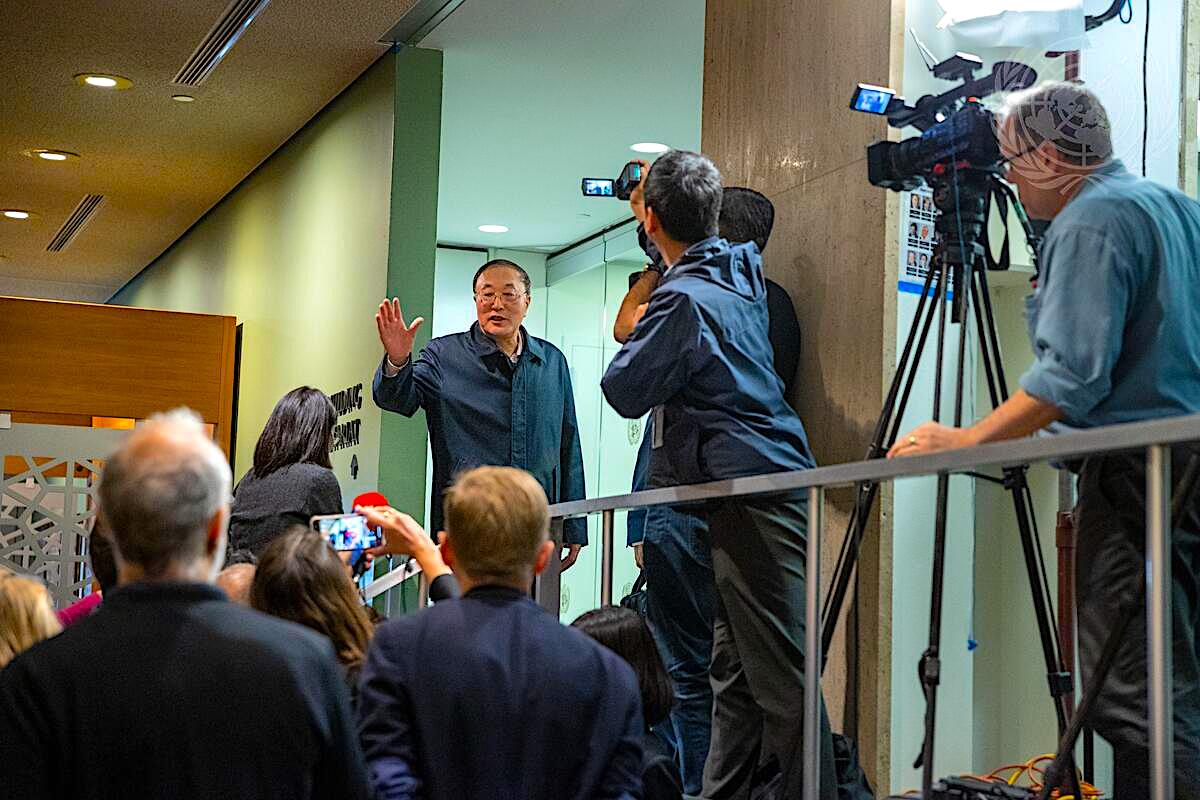The war in Gaza serves as a smokescreen to the escalation of settler expansion and violence in the West Bank, writes Dan Steinbock. Meanwhile, Biden’s hawks refocus on Iran. Last of a 5-part series.

Sept. 8, 2006: Israeli soldier checking IDs of four Palestinian men on a 4 men on a tractor in the West Bank city of Nablus. (Michael loadenthal, Flickr, CC BY-NC-SA 2.0)
This is the final article in a five-part series. Here is part one, two, three and four.
By Dan Steinbock
The World Financial Review
 The Jewish settlements have fostered a de facto one-state reality in Israel, wherein Israelis have rights and Palestinians don´t. Meanwhile, talks for a two-state solution have been stalling since 2014. Rhetoric aside, Prime Minister Benhamin Netanyahu’s government has “engaged in actions that annex the West Bank and threaten the prospects for a just and lasting resolution to the Israeli-Palestinian conflict.”
The Jewish settlements have fostered a de facto one-state reality in Israel, wherein Israelis have rights and Palestinians don´t. Meanwhile, talks for a two-state solution have been stalling since 2014. Rhetoric aside, Prime Minister Benhamin Netanyahu’s government has “engaged in actions that annex the West Bank and threaten the prospects for a just and lasting resolution to the Israeli-Palestinian conflict.”
In the past, periods of heightened security tension and military operations have ensured an opportunity for settlers to establish facts on the ground. After the brutal attack by Hamas, the alarming trend of increased settler violence has rapidly escalated. Nothing has halted the settlers’ steady expansion since the late 1960s and the Israelis’ expansion in East Jerusalem.

Expansion of Jewish settlers in the West Bank, 1967-2021. (ICBC)
In South Africa, the system of apartheid, based on white supremacy and racial segregation, was in place from 1948 until 1994. In April 2021, Human Rights Watch warned that Israel had crossed the apartheid threshold.
In early September this year, the ex-chief of Mossad, Tamir Pardo, said that Israel’s mechanisms for controlling the Palestinians matched the old South Africa. “There is an apartheid state here,” since “two people are judged under two legal systems.”
Even amid the peace talks in Oslo in the early 1990s, Palestinian per capita income was just 15 percent relative to the Israeli level. But hopes for peace died with the Jewish far-right assassination of Prime Minister Yitzhak Rabin.
Despite all the hoopla by the Trump and Biden administrations that the Middle East is at the cusp of peace and prosperity, Palestinian per capita income has fallen and is now only 12.9 per cent relative to the Israeli level, lower than decades ago.
As bad as these aggregate figures are, they reflect Palestinian averages, not Gaza’s hell. Years of isolation and recurrent conflicts have left the local economy far behind the West Bank’s, due to the Israeli-imposed blockade, four wars, and domestic divisions.
Gazan per capita income is now less than a third of that in the West Bank. Half of the labour is unemployed; over half of the population lives below the national poverty line, according to International Monetary Fund data.
Long before the Hamas offensive, Palestinian stagnation reflected economic ruin that was excessive even relative to apartheid South Africa. During the apartheid (1948-94), blacks’ per capita income relative to the whites climbed from 8.6 per cent to 13.5 per cent. In relative terms, the Palestinians’ starting point relative to Israelis was almost twice as high after the Oslo Accords. But today it’s behind that of blacks at the end of the apartheid. The reversal occurred under the watch of the Trump and Biden administrations.

Two Kinds of Apartheid: South Africa to Palestine. (Author; data from IMF)
Farsighted Israeli leaders no longer deny the reality of apartheid. Last year, former Attorney General Michael Ben-Yair called Israel “an apartheid regime.” Recently, the Parliament’s former speaker, Avraham Burg, and renowned historian Benny Morris were among more than 2,000 Israeli and U.S. public figures who signed a public statement that “Palestinians live under a regime of apartheid.”
Hall of Mirrors
The standard narrative about the 2023 War in Gaza is a mere façade. Even the argument that Hamas’ offensive was an “intelligence failure” doesn’t seem valid. Based on two years of video evidence, Hamas militants trained for the brutal attacks in at least six sites across Gaza in plain sight and less than a mile from Israel’s heavily fortified and monitored border. For all practical purposes, the offensive was preventable. If the intelligence failure wasn’t a failure at all, what was it?
Similarly, the naïve story about Hamas as Israel’s nemesis doesn’t hold water. The group and its brutal attacks went hand-in-hand with more than two decades during which Likud and the far-right were rising.
Just as the Operation Cyclone had led the U.S. to train, arm and finance a generation of Islamist fedayeen in Afghanistan, including Osama Bin Laden, Israelis thought they could use Hamas; not that Hamas could use them.
Moreover, the war in Gaza serves as a smokescreen to the escalation of settler expansion and violence in the West Bank, which Netanyahu’s far-right ministers hope would result in its annexation and Palestinian expulsions.
Regionally, the war has led U.S. President Joe Biden’s hawks to refocus attention on Iran. It’s an old project. Since 2003, the U.S. Army has conducted an analysis called TIRANNT (Theater Iran Near-Term) for a full-scale war with Iran.
Reportedly, this contingency plan (CONPLAN 8022) would be activated in the eventuality of a second 9/11, on the presumption that Iran would be behind it.
Expectedly, the war has inflamed tensions with Hezbollah in southern Lebanon, which many in the U.S. Congress and the White House would like to link with Iran, to legitimize a major regional confrontation.
Tellingly, after the Hamas attack, when Republican Sen. Lindsay Graham was asked whether he wanted the U.S. and Israel to “bomb Iran even in the absence of direct evidence of their involvement,” he responded, “Yeah.” The answer stunned even the CNN interviewer, so she asked the question twice and got the same response.
Recently, U.S. Rep. Michael McCaul, the Republican chair of the U.S. House Foreign Affairs Committee, said his panel is drafting legislation to authorize the use of military force in Iran, although U.S. intelligence has said there is no evidence to support the claim of Iran’s direct involvement. McCaul’s comments came on the 21st anniversary of the enactment of a measure that authorized the 2003 misguided U.S. invasion of Iraq.
To Netanyahu’s government, an Iran conflict would divert attention from Gaza and the West Bank. It’s a long dream.

Protest in Tehran opposing Israeli assault on the Gaza Strip, Oct. 14. (Amin Ahouei, TasminNews, Wikimedia Commons, CC BY-SA 4.0)
In 2011 Netanyahu ordered the Mossad and Israel Defense Forces to prepare for an attack on Iran within 15 days, until Pardo and then-Chief of Staff Benny Gantz — now in opposition but a key member in Netanyahu’s not-so-united war cabinet — questioned the prime minister’s legal authority to give such an order without cabinet approval. So, Netanyahu backed off.
But Iran remains on the government’s agenda. And some critics argue that it is part of the Gaza war agenda. A month ago, in parallel with the domestic Supreme Court turmoil, Netanyahu’s Mossad chief David Barnea vowed to target Iran’s “highest echelon” if Israeli Jews would be hurt in terror.44
Nor has the Biden administration avoided the temptation to use the war and its “solidarity with Israel” as a demonstration effect for other hotspots. When Defence Secretary Lloyd Austin met with Netanyahu and members of the Israeli war cabinet, he conveyed the U.S.’ “ironclad support” for Israel.
It is the liturgical term that the White House has used in the context of Japan, Taiwan, Ukraine, the Philippines and other major U.S. non-NATO allies that have committed to common defence objectives, military bases and arms purchases from U.S. Big Defense, such a Raytheon, Austin’s former employer.
Giving Peace a Chance, Finally

Zhang Jun, China’s U.N. ambassador, center, after the Security Council meeting on the Middle East, Oct. 18. (UN Photo/Paulo Filgueiras)
The ongoing war has severely undermined U.S. credibility as a neutral broker in the region. Officially, Washington seeks to de-escalate tensions. But rhetoric aside, as Israel escalated its counter-offensive, U.S. diplomats were being discouraged from publicly using phrases that would urge calm. In leaked messages, State Department staff wrote that high-level officials did not want press materials to include three specific phrases: “de-escalation/ceasefire,” “end to violence/bloodshed” and “restoring calm.” It preceded the U.S. veto in the U.N. Security Council to block a “humanitarian pause” and corridors into Gaza.
The Democratic Biden administration has continued Trump’s Middle East policies, which effectively ignore the Palestinian nightmare. Washington’s bipartisan consensus is driven by the priorities of the Pentagon and the Big Defense, which profits from every new major violent conflict by selling security without peace. The Gaza war is a textbook case.
In the first week of its counter-offensive, Israel dropped 6,000 bombs on Gaza. That’s almost the number of bombs the U.S. dropped on Afghanistan in an entire year. But that may be just a prelude to what’s still ahead. If and when the expected Israeli ground assault – a “disaster foretold,” as the Israeli columnist Gideon Levy puts it – will begin, all these casualty figures will pale in comparison.
Israel continues to bombard Gaza and progress toward a ground invasion of the besieged enclave.
? Follow our LIVE coverage: https://t.co/Qe25hKt0GS pic.twitter.com/i0GivLKlCx
— Al Jazeera English (@AJEnglish) November 1, 2023
When one million people are internally displaced, 90,000 residential units are damaged, electricity and water are effectively denied (and all this before the actual assault), the consequent damage can no longer be considered collateral but intended. And if health systems collapse, misery and vice will follow in the form of famine, epidemics paving the way to new massacres and new wars.
From newborn babies to Nakba survivors, the death toll from Israel’s war on the besieged Gaza Strip has surpassed 8,500 Palestinians.
We look at the numbers to illustrate the scale of the devastation ??
?: https://t.co/hRNy7Yb8vL pic.twitter.com/0CNyEEDyHv
— Al Jazeera English (@AJEnglish) November 1, 2023
Today, the worst economic risks are unwarranted geopolitical tensions. The outbreak of the 2023 War in Gaza is threatening to inject new volatility into energy markets, harking back to last year’s commodity chaos after the proxy war in Ukraine. As Biden made his primetime case for “wartime aid to Israel and Ukraine,” he expanded U.S. involvement into two major fronts; multiplied the need for tens of billions of dollars in military aid in addition to the past hundreds of billions of dollars; and accelerated the probability of a looming U.S. debt crisis that could have global repercussions.
After $8 trillion in the misguided post-9/11 wars in Afghanistan and Iraq, U.S. war theaters have not disappeared. It’s only the arenas that are shifting. The Biden administration is preparing another unwarranted Global Cold War in a perceived Manichean world of “noble democracies” and “evil autocracies.”
In the past half a century, no U.S.-brokered initiative has achieved enduring peace in the Middle East. Washington has a geopolitical interest in the region as an energy reserve and U.S. defence contractors’ lucrative client. By contrast, China’s approach is premised on stability and cooperation that are necessary for economic development. Stressing the importance of peace and development, Beijing has called for an “immediate ceasefire” and repeated its support for a two-state solution with an independent state of Palestine as a way out of the conflict.
Both the U.S. and China have a role in the Middle East. But without peace, there can be no stability. And without stability, there can be no development. Half a century of wars, colonisation and apartheid will never bring peace to the region; but they will surely ensure more despair, more wars and more dead and injured civilians. What is needed in the region is multilateral cooperation and multipolar diplomacy.
It is time to give peace and development a chance – before it’s too late.
Dr. Dan Steinbock is the founder of Difference Group and has served at the India, China and America Institute (U.S.), Shanghai Institute for International Studies (China) and the EU Center (Singapore). For more, see here.
The original version of this article was published by The World Financial Review.
The views expressed are solely those of the author and may or may not reflect those of Consortium News.

” …. talks for a two-state solution have been stalling since 2014.”
Might i suggest that those talks are, and actually have been, the “smokescreen” for increasing settler expansion, ethnic cleansing and now genocide over the years …. there was never any intent to have “2 states” but talking about them led people to think that was a “solution” – and while they were “talking” Israel was steadily expanding, creating more and more “facts on the ground” to the point that it is pretty obvious there is not enough Palestinian territory left for any sort of viable state, and hasn’t been for some time, even as they keep “talking” …
I am glad he happened to mention that the US Sec. Defense is “formerly” employed by Raytheon, one of the biggest beneficiaries of our “support for our allies” I think this fact should always be appended to any mention of him – “Sec. of Def., Lloyd Austin, formerly of Raytheon” because it doesn’t seem to have yet sunk in …
Anybody writing that Israel has “crossed the threshold” of being an apartheid state…as this author quotes Human Rights Watch, is extremely misleading. Israel has been an apartheid state since its Basic Laws in 1948. Israeli historian Uri Davis examined the structure of the Basic Laws in great detail in his book “Apartheid Israel”. The author of this article should read the book and EVERYONE ELSE who continues to say anything different.
Looks to me like China is the only adult in the room. What a concept – “immediate cease fire”!
It is inconceivable that the US would be preparing for war with Iran. Yet we have people like Lindsay Graham and Michael McCaul advocating just that. And with 2 aircraft carriers, and now a nuclear sub in the region, there is every reason to believe that we could in fact wind up with another regional war. Don’t these imbeciles even think about the consequences of war with Iran? The butchery in Gaza we are now witnessing would be nothing in comparison. And if some unhinged party decides to use a nuclear weapon, then we will have seen the last of “civilization.” Is there nothing or no one to stop this insanity?
“Is there nothing or no one to stop this insanity?”
Not as long as we keep putting D/Rs in office…
“The ongoing war has severely undermined U.S. credibility as a neutral broker in the region”
How can Washington have lost something it has never had?